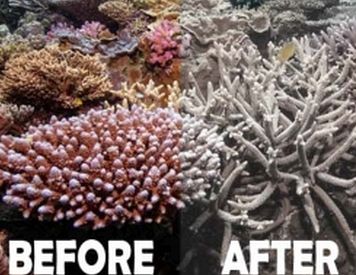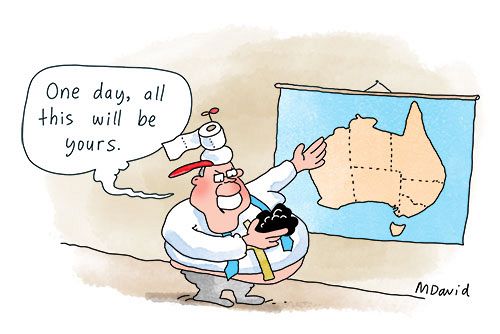As the new Parliament promises greater climate action, another mass bleaching event has impacted the Great Barrier Reef, raising urgent questions about its survival over the long term.
However, the report emphasised that 'it is important to note that bleached corals are alive, but stressed'.
Dr Rowston told IA that:
"Exposing coral to higher temperatures causes bleaching... if that happens every so often, most of the coral species can recover, but when it's happening so regularly, they don't have a chance to recover."
The extent of the damage to the Great Barrier Reef – the world's largest and most distinctive coral reef ecosystem – remains to be examined by experts in 'underwater surveys'.
Assessing the causes: Why is the Reef on a precipice?
The 'Reef Snapshot' unambiguously states that:
'Climate change remains the greatest threat to the Reef.'
Further, the report outlines that:
'Climate change is escalating, and the Reef is already experiencing the consequences of this. Unfortunately, the events that cause disturbances on the Reef are becoming more frequent, leaving less time for coral recovery.'
Dr Rowston told IA that:
"There are other impacts to the Reef in terms of water quality entering from catchments, overfishing, anchoring, recreational use, but the number one threat is absolutely climate change."
"Our warming environment, the marine heatwaves we're experiencing, are causing most of the bleaching", believes Dr Rowston.
This position is consistent with the assessment of the United Nations Intergovernmental Panel on Climate Change (IPCC) — a contingent of scientists with expertise in climate science. The IPCC's report, 'Climate change 2022: Impacts, adaptation and vulnerability' says that parts of the Reef are already in a 'highly degraded state'.
The 'four key stresses' identified by the GBRMPA, AIMS and CSIRO affecting the Reef are above-average sea temperatures, cyclones and storms, mud-laden flooding, and crown of thorns starfish.
Dr Rowston is of the view that:
"Building reef resilience is always a good thing, so having some technologies in place to help the Reef recover and reducing the impacts of crown of thorns starfish, [addressing] water quality, are all very positive steps... but reducing our emissions must be our number one priority."
While the Reef faces "an existential risk", Dr Rowston says that if Australia can take "serious climate action" to keep surface temperatures at or below 1.5° Celsius above pre-industrial levels, then the Great Barrier Reef could avert a future of permanent bleaching and degradation.
The climate policy the Coalition took to the 2022 Election was consistent with a future of 3°Celsius temperature increase. The Labor Party's current policy aligns with an increase of 2°Celsius temperature above pre-industrial levels.
To safeguard the future of the Reef, the Capricorn Conservation Council is urging the incoming Labor Government to:
"Establish a moratorium on any new or expanding coal or gas projects... more renewable projects, transmission lines to feed renewables into our grid... move towards electric vehicles. There are many things the Government can and should do in this space."
'Unconscionable': Proposal for mine 10km from the Reef still standing
A subsidiary of mining magnate and Chairman of the United Australia Party, Clive Palmer's Mineralogy, proposed establishing a mine just north of Rockhampton.
That mine would be located 10 kilometres from the coast of the Great Barrier Reef.
An environmental impact statement (EIS) was drafted to examine the possible consequences of establishing this mine. The Federal Government's own "independent expert scientific committee" reviewed the EIS. This committee decided that the mine was not "suitable" and would cause "significant and irreversible" impacts on the Reef.
In an unprecedented step, the Queensland Government refused to approve the mine based on the risks it would pose to the Reef. The relevant information was submitted to the former Minister for the Environment, Sussan Ley. However, the Coalition Government did not take steps to reject the mine proposal for over a year and now the matter will fall to the incoming Labor Government for consideration.
The Capricorn Conservation Council "would like to see the current Government, as one of the first things they do, reject the proposal, says Dr Rowston.
Where do the progressive parties stand on the Reef and climate?
Elected by a wave of support, in part, for more action on climate, Labor, the Greens and the "teal" independents have all committed to taking the issue of climate change more seriously than the former Morrison Government.
In his victory speech on 21 May, Prime Minister Anthony Albanese declared that:
"Together we can end the climate wars."
Currently, Labor is proposing to cut Australia's carbon emissions by 43% by 2030 and hitting its "net-zero" target by 2050. By contrast, the Coalition had only committed to reducing emissions by at least 26% by 2030.
The Greens – which received the highest vote tally in its history last Saturday – want a 75% cut in Australia's carbon emissions by 2030 and to achieve net-zero emissions by 2035.
The newly-elected "teal" independents – including Wentworth MP Allegra Spender, Kooyong MP Monique Ryan and Goldstein MP Zoe Daniel – all support a reduction of 50% or more by 2030.
Dr Rowston said:
"The recent Federal Election [result] was very, very encouraging that there will be some strong voices in both houses of Parliament who really care and want climate action. That can only help in strengthening Labor's policy position as time goes on."
Labor's pre-election policy on the Great Barrier Reef included a commitment of almost $1.2 billion to "preserve and restore" the Reef by 2030 'through climate action, catchment restoration, and protecting the Reef’s threatened species'.
The Greens proposed to invest $2 billion to enhance water quality, defund the controversial Great Barrier Reef Foundation and redivert the $443 million it had received from the previous Government, and increase the funding of the GBRMPA and AIMS by $90 million.
The 47th Parliament – the composition of which remains to be finally determined – faces the herculean task of stemming the decades-long damage inflicted upon the Great Barrier Reef.
Nicholas Bugeja is a Bachelor of Laws (Honours) and Arts graduate from Monash University and an Assistant Editor for Independent Australia.
Related Articles
- The Coalition's 'dreadful' legacy on the Great Barrier Reef
- Scott Morrison is a threat to the Great Barrier Reef
- Coalition's fossil fuel obsession threatens Great Barrier Reef
- The Great Barrier Reef has a critical temperature
- Great Barrier Reef: Sky News and Peter Ridd are deliberately misleading
 This work is licensed under a Creative Commons Attribution-NonCommercial-NoDerivs 3.0 Australia License
This work is licensed under a Creative Commons Attribution-NonCommercial-NoDerivs 3.0 Australia License
Support independent journalism Subscribe to IA.















